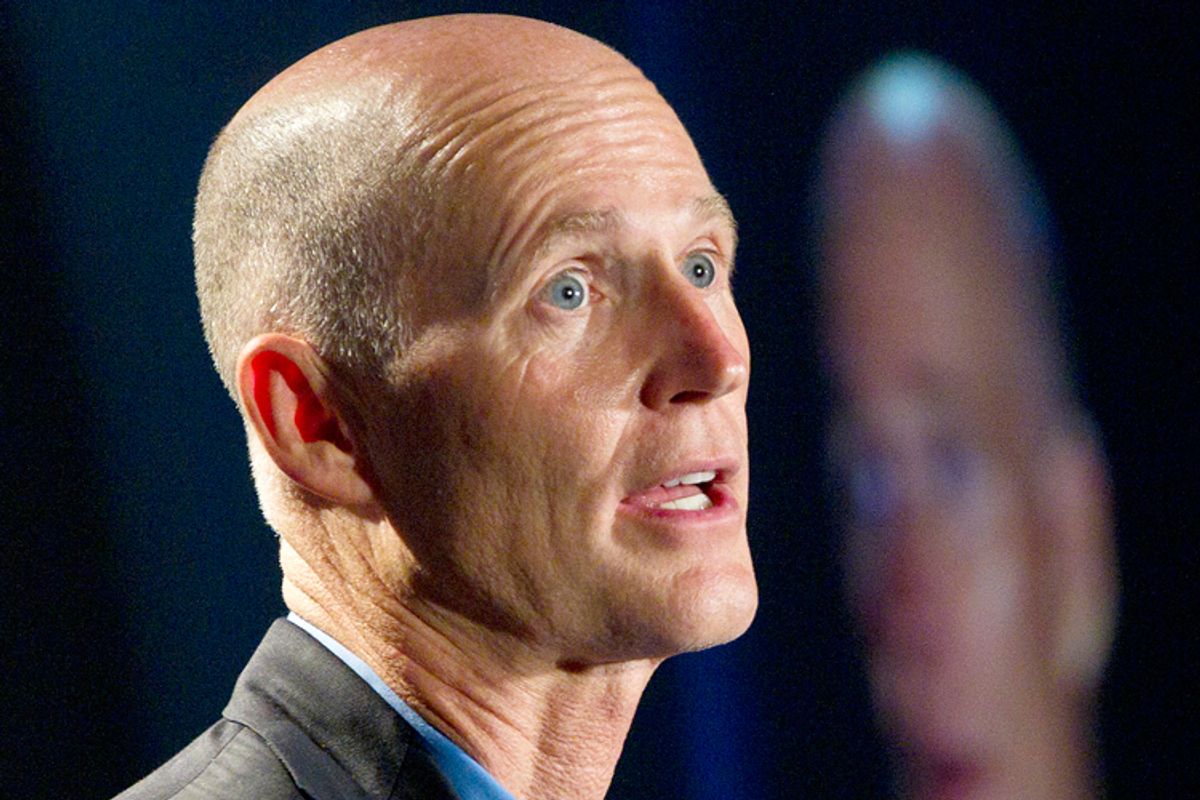So here we are, a day out from the election, and things are looking pretty good for the GOP as they work to take full of control of Congress for the first time since 2006. If you’re a fan of the Affordable Care Act, or generally get down on increasing access to health care, then you’re probably a bit worried by this development. By and large, Republicans actively despise the Affordable Care Act, they’re claiming a mandate to repeal it, and they don’t have a replacement plan at the ready for when they uproot the ACA “root and branch,” as the would-be Senate majority leader is fond of saying. Add onto that a potentially destructive anti-Obamacare lawsuit that might just tickle the overdeveloped ideological centers of the conservative justice hivemind, and you can be forgiven for feeling a little… apprehensive.
Well buck up, you sniveling worrywart. Things aren’t as bad as they seem. Quite the opposite, actually! There’s a good chance tomorrow’s ballot casting will bring some good news for the Affordable Care Act, and may help bring expanded health coverage to some states that desperately need it. It all comes down to the gubernatorial races, in which Democrats are pretty well set up to topple a few Republican incumbents.
Back in 2012, when the Supreme Court (barely) upheld the constitutionality of the ACA, it struck down the provision that would have forced states to accept funding for expanding Medicaid eligibility, saying that participation in the expansion should be optional. States led by Democrats were quick to embrace the expansion, and even a few Republican-led states like Ohio and Arizona signed on as well. This made a lot of sense: the feds would pay the entire cost of the expansion for the first few years, and then 90 percent of it going forward. It’s a good deal, and it provides access to health coverage for state residents who otherwise couldn’t afford it.
For the most part, though, Republican governors flat-out rejected the expanded Medicaid funding. A number of them claimed the mantle of fiscal responsibility, arguing that they didn’t trust the federal government to make good on its commitments, but the opposition was mainly ideological: the Medicaid expansion is “Obamacare,” and “Obamacare” is bad. Not surprisingly, the states that embraced expanded Medicaid saw larger drops in their number of uninsured than the states that opposed it.
Expanded Medicaid has since become an issue in the gubernatorial races. Time magazine identified six races in which Republican incumbents are trailing (or in toss-ups with) either Democratic or independent challengers who have promised to expand Medicaid in their states should they be elected. The biggest prize is, without a doubt, Florida. Gov. Rick Scott fought and sabotaged the implementation of Obamacare at every turn, leaving an estimated $66 billion in Medicaid funds on the table and denying coverage to an about one million low-income Floridians. Scott is running slightly behind Democrat Charlie Crist, who’s suggested he’ll sign an executive order approving the expansion.
Another important state to watch is Kansas. While it doesn’t have anywhere near the number of uninsured that Florida does, a successful push to expand Medicaid in the state would be a huge symbolic victory. Incumbent governor, Sam Brownback, turned the state into a laboratory of hardline conservative policymaking. If the state were to vote him out and sign on to the president’s health law, that would send a powerful message. (The Democratic challenger, Paul Davis, would have to gain approval from the Republican-controlled legislature, as Time notes, so it’s an uphill struggle.)
The other states where Democrats or independents could topple anti-Medicaid expansion governors are Alaska, Maine, Wisconsin, and Georgia. If each of the Republicans running those states gets booted out, and if their replacements can successfully expand Medicaid, well over two million eligible people could gain access to healthcare. That’s huge.
But let’s say the Republicans have a really good night and each of the states mentioned above remains in GOP hands. Even in that scenario, things are still looking fairly good for expanded Medicaid. Opposition among Republican governors is crumbling nationwide. The governors of Tennessee, Wyoming, and Utah – Republicans all – are working on plans that would allow their states to accept Medicaid expansion funds. North Carolina’s Pat McCrory, after initially rejecting expanded Medicaid, is now telling people that he’s reconsidering that choice. Even Rick Scott has flipped on the issue, claiming that he supports expansion but it’s not a legislative priority.
For all the rhetorical posturing and overheated campaign slogans about repeal, the nationwide trend has been moving slowly and consistently towards embracing the Affordable Care Act. Even the most repeal-happy 2014 candidates are acknowledging that Obamacare will stick around. So while there’s likely to be a lot of crowing on election night about the American people’s rejection of the president big-government socialist health law, the reality on the ground in the red states is one of changing attitudes and newfound willingness to embrace the Affordable Care Act.



Shares